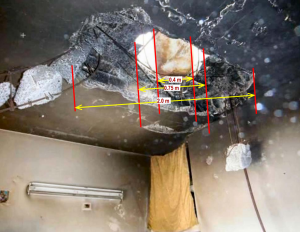 Theodore Postol, professor of science, technology, and national security policy at the Massachusetts Institute of Technology, has provided the Institute for Public Accuracy with a detailed assessment of a report the Organisation for the Prohibition of Chemical Weapons provided the UN Security Council earlier this year, see below. Assessing the evidence and the content of OPCW material, Postol states that the OPCW is “compromised” and has engaged in “deception.”
Theodore Postol, professor of science, technology, and national security policy at the Massachusetts Institute of Technology, has provided the Institute for Public Accuracy with a detailed assessment of a report the Organisation for the Prohibition of Chemical Weapons provided the UN Security Council earlier this year, see below. Assessing the evidence and the content of OPCW material, Postol states that the OPCW is “compromised” and has engaged in “deception.”
The report in question was submitted to the UN Security Council on March 1 of this year. An engineering assessment for the OPCW, which is dated Feb, 27, just two days earlier, was kept from the public and UN Security Council until it was made public last month by the British-based Working Group on Syria, Propaganda and Media.
The reports were about an alleged April 7, 2018 chemical weapons attack in Douma. On April 13, Trump announced U.S., British and French strikes against the Syrian government citing the alleged chemical weapons attack in Douma.
In contrast to the “contradictory” March 1 document given to the Security Council by the OPCW’s political leadership, Postol regarded the until-recently-hidden Feb. 27 engineering report to be a “superb piece of professional work” which informed his assessment of the March 1 document touted by the OPCW’s political leadership.
Assessing the evidence, Postol has stated that the “gas attacks were staged.” Now, after scrutinizing what information the OPCW gave to the UN Security Council, he stated of the March 1 document: “The calculations produced as proof for the conclusions bear no relationship to what was observed at the scene and both the observed data from the scene and the calculations bear no relationship to the reported findings.”
Postol added: “The OPCW has been compromised in terms of the content they are providing. The deception of the OPCW is quite blatant. Perhaps they are not used to people who are knowledgeable on these issues scrutinizing their material.”
Postol’s detailed assessment scrutinizing the March 1 report states: “A review of the science-based analysis that appears to have been aimed at supporting the conclusions of the UN OPCW Fact-Finding Mission Report S/1731/2019 shows that the science-based analysis in the report completely contradict both the report’s conclusions and observed data.
“It therefore appears to be inescapable that this report must have been written without regard for the facts collected by the Fact Finding Mission or the results of the included science-based technical analyses. …
“An inspection of the photograph quickly shows that the diameter of the hole predicted by the finite element calculation does not match the diameter of the cylinder. It also shows that the rebar failed catastrophically due to an extremely intense impulse that was considerably larger than that associated with the low speed impact of a chlorine cylinder. … Thus, the conclusion stated by the OPCW report that the hole in the roof was produced by the falling cylinder is completely unsupported by both the observed evidence and the misleading finite element calculation.”
Postol is available for a limited number of interviews: postol at mit.edu.
See Postol’s assessment: “Contradictions in the Conclusions, Science and Data in the UN OPCW Fact-Finding Mission Report S/1731/2019 on the Chlorine Cylinder Attack on 7 April 2018 in Douma, Syria,” below:

